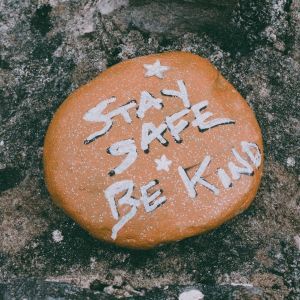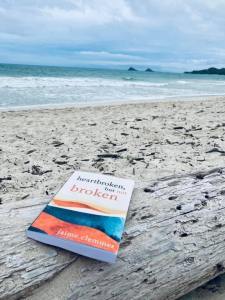Exponent II's Blog, page 140
May 31, 2021
Guest Post: It May be Legal But Is It Moral?
Guest Post by Lavender. Lavender was thrilled to discover that a few generations ago, her ancestors had the last name of Lavender. A Midwesterner who has lived her adult life in Logan and Salt Lake City, Utah, she enjoys biking, skiing, hiking in the desert, reading, eating dark chocolate, and diagramming sentences. Lavender recognizes the value of educational and professional opportunities that continually push her to grow. Most of all, she gives credit to her daughters whose questions from the time they were tiny pushed her onto the path of feminism.
O n a recent Sunday afternoon a group text was sent to young women and parents asking who was planning on attending young women’s camp and youth conference this summer. As responses rolled in, I asked for information regarding covid precautions: would vaccines be encouraged and negative covid tests required? The covid vaccination rate in our area is barely over 34% with ages 12-15 only recently eligible to receive the vaccine. Young women’s camp will occur before any 12-15 year olds have enough time to be fully vaccinated.
n a recent Sunday afternoon a group text was sent to young women and parents asking who was planning on attending young women’s camp and youth conference this summer. As responses rolled in, I asked for information regarding covid precautions: would vaccines be encouraged and negative covid tests required? The covid vaccination rate in our area is barely over 34% with ages 12-15 only recently eligible to receive the vaccine. Young women’s camp will occur before any 12-15 year olds have enough time to be fully vaccinated.
When the young women’s president came to my home to answer my question in person, her response was startlingly unexpected. She said they were not legally required to take any precautions and so would not be doing anything. If I was uncomfortable with my yet-to-be-fully-vaccinated daughters attending, then I should plan on them staying home. She also informed me that because she feels differently about the vaccine than I do, that it is really hard for her to talk to me about it.
Picture me with my mouth agape. I still do not know how to process this; an action that was the opposite of the commandment to love our neighbors. I am stunned that a neighbor, ward member, and youth leader is fine with potentially exposing other people, including the young women in her stewardship, to a contagious virus whose effect is unpredictable. Since this conversation, I have had to pause during the day to take deep breaths, meditate, pick up a slam ball and throw it to the ground a bunch of times; whatever I can do to stay grounded. At least I have done the work to separate my relationship with God out from my relationship with the church. I can take this to God; already I have felt Heavenly Mother’s awareness of me. My daughters are Her daughters too.
The bigger picture problem, in my opinion, is lack of consistent guidance from the church. I realize this has been a problem throughout the pandemic. I also realize that since I have not had to face any issues with the church locally during the pandemic that this now seems big to me. There are others who have been dealing with frustrating leadership choices for a long, long time.
Another problem is a cultural tendency to assume that because it is a church activity, that means those in charge have made it safe. I expressed my bewilderment to a friend that while church guidance around covid is inconsistent and lacking in thoroughness, Girl Scouts across the country have made significant adaptations to camp this summer to prevent covid transmission. Our local council held an hour-long zoom call to explain the adaptations, which include testing prior to arrival along with other items, and provide an opportunity for parents and girls to ask questions. Why not the same level of concern from church leaders? I acknowledge that the church is staffed by lay people. At the same time, the church also has an office tower full of employees from nearly every professional field including risk management. Why the silence about covid precautions at youth activities this coming summer? I believe that as parents we must not give away our authority to others by acquiescing on our obligation to ensure our children’s safety. We must ask questions and establish boundaries.
So, what to do about camp and youth conference? After this encounter, my daughters will not attend. Does it do any good, though, to write to the general young women’s presidency in hope that they will at least be aware of what is happening and perhaps make guidelines to protect the youth? Just because my local government does not legally require any precautions, it is not moral for anyone in the church to not to take precautions. This is one of many experiences that has galvanized in me the desire to always speak up for the marginalized, to always think of the ‘least of these’, to remember that every other human being on this planet is my neighbor and a child of God.
May 30, 2021
Guest Post: Mother’s Whisper
 Can anyone see me?
Can anyone see me?
Here, me, tranquility
You know my name
Feminine divinity.
I am the earth
Renegade
Steady, strong, and sure
Mischievous, full of hearty laughter and mirth
I am heaven
Pure, Celestial
Peaceful
Never ceasing
I am all you need, all you want
I am your flesh
I am your spirit
You know me as I know you
They blind you
They bind you
Cast up false idols in my name
Their tactics fail; love will prevail
My body, my spirit, my soul
My sacrifice belongs to you
Now and forever
Unconditionally
See me
Look
See me.
——-
Sherry was born and raised in the church, attended BYU, served a mission, married in the temple and then, holding her newborn baby for the first time, she met god.
She is now embracing the infinite unknown as she navigates a new path with her two kids and devoted husband.
May 26, 2021
We Are All Enlisted
It was not my customary weaponry, but it was familiar enough. Shears sharpened and cannon loaded with a fresh needle, I was ready. The instructions were clear and simple, but I still double checked with the woman in charge to make sure I did the job right.
My daughter and I did not wait for the draft; we were active volunteers. Patterns for non-disposable menstrual pads were being cut and sewn in bulk. Because I was an experienced seamstress, I was assigned the slightly-more advanced needle work of sewing the curves to be fitted around legs.
The War on Women has long been waged by men (and pro-patriarchy women) wielding weapons of patriarchal culture. For centuries women have survived through this, yet I like to think that over the past two centuries, our defences have morphed into action—an action making it a War FOR Women.
This new action realised by my Mormon mothers. For the Pioneer era, it was in sewing shirts for men in support of construction of the temple and clothing the impoverished Native Americans who were displaced time and time again, making it not only a war for women, but a war against poverty.
In the Utah Era, my Mormon mothers carried sabres of pens and papers, wherein they enlisted 13,000 names in favour of women’s suffrage within the United States. This created a feminist friendship that resulted in weaving the finest silk for the gift of a dress of Mormon women’s long-time friend, Susan B. Anthony.
As wars came and went, the weapons yielded by women resulted in droves of canned peaches, repurposed fabrics that were hand-patched into quilts, and mountainous canisters of flour. My own mother saw her war in missionary work, sewing sleeves on dresses to make them temple-worthy, joining a union to protest for equal pay, and creating costumes for pageants and roadshows where she hoped potential converts might grasp a part of the passion she felt. She later saw the benevolence in making birth control available, but spoke so only in whispers, afraid of the air raids that would strike her from above.
A scant decade ago, beloved Mormon female friend called for battle in her native Fiji, gathering donations of fabric, thread and notions. The church stepped in and gifted the women with first-class Berninas, Janomes and Husqvarnas. These weapons empowered Fijian women to quilt goods that were then sold to tourists, thereby providing political, social and economic independence through income.
For myself, I have spent decades waged in a personal war for reproductive and infertility treatment, in addition to being entrenched with my sisters in battles for equal pay, safety from sexual abuse, and being respected at church. Strange how that last item falls in with domestic terrorism against women. And yet, it does.
The war is not over. Women still do not make a wage that compares to men. Poverty is not solved. Domestic violence, an ongoing issue, took a sinister turn up during COVID. This re-ignited a long-fought battle for the right to not be hit, the right to not be sexually assaulted, the right to be treated with dignity.
Dignity was my battle for the day, as a part of a Days For Girls International.
 I was using an industrial sewing machine. Each puncture of the needed in the layered fabrics sounded like rapid machine gun fire. These thread pellets were battling the way for a young woman in East Timor to be able to attend school during her monthly periods. A simple, human thing, and yet a crusade. A major crusade.
I was using an industrial sewing machine. Each puncture of the needed in the layered fabrics sounded like rapid machine gun fire. These thread pellets were battling the way for a young woman in East Timor to be able to attend school during her monthly periods. A simple, human thing, and yet a crusade. A major crusade.
It was and is a war that I was proud to be engaged in with my daughter. She was folding, positioning fabric and pinning her heart out. She originally did not want to come; she had better things to do on that Sunday afternoon. But she was born into this war, and that moment was a teaching opportunity like no other. Like a natural, she stepped up and was thrilled to be in combat. She knew she was doing right. God bless her.
I noticed mid-battle how few women knew how to operate sewing machines. It made me grateful for my mother, and for the odd Young Women activity that taught basic sewing, empowering me in way that is not as fashionable or necessary as it once was. And yet… I wondered if the church would be as partnered with me, fighting for the dignity of women, as it seemed to once be.
As the church ages, it seems to me that it is focuses less and less on the War For Women, and more and more on the sustaining of patriarchy. As I sewed, I wondered if my daughter will want to remain within a church that does not appear to fight for her as much as it appears to fights for its own patriarchal structure.
I don’t know. So I kept sewing.
I hope the church will right itself. I hope it will work alongside women in progression of humankind.
I hope.
I battle.
I wage war for women.
And I pray.
Notes:
Women of Covenant, p 137, 170, and more.
May 24, 2021
A Work In Progress
 –In my dream…The doors were open wide.There were people outside eager to enter, but they held back when they saw that everyone was welcome. Everyone, even those who didn’t look like them. Even those they had rejected. They were confused, even distressed, and didn’t know what to do, where to go. They waited outside for a long time.We entered and the building was larger inside, growing larger as more entered.The Being greeted us.The Being said They never used Their keys to lock the doors.The kingdom is for everyone,Within and without.I looked at the Being, and was reminded of Mike Quinn years ago, when we talked of what belonging meant.The Being beckoned to more people, and They looked like the woman in the mountain village in Guatemala, handing me her child, letting me carry her so I could know, for a moment, what it felt like to carry a baby who had no legs.Then They held a person who was crying out in anger and pain, wondering why they had tried so hard to hide who they were, all their life – and now they see that there was always a place for them – and the Being took and held their anger and pain, and wept with them, and the Being looked like Fatimah.The Being called out to someone outside, to someone who was hesitating because they knew the pain of being outside, and were not sure if it would hurt more, this experience of belonging. The Being reached out, smiling and speaking the name of this someone, and this someone was the most beloved, and the Being sounded like my dad.The Being saw a woman standing alone, wondering where she could and couldn’t be, what she could and couldn’t say. The Being stood by her, asked her to speak, and listened so completely, so unconditionally – and all the wisdom and revelations and divinely human experience flowed from this woman. We stood in awe, receiving knowledge from her that had the power to save, standing next to the Being who looked like Lavina.And the inside grew as more were drawn to the place where all, all belong, until there was no other place.There is no place for others.There is only one great whole.We are all anointed by the blood that flows through all of us…by the tears that fall from all of us.We all belong.
–In my dream…The doors were open wide.There were people outside eager to enter, but they held back when they saw that everyone was welcome. Everyone, even those who didn’t look like them. Even those they had rejected. They were confused, even distressed, and didn’t know what to do, where to go. They waited outside for a long time.We entered and the building was larger inside, growing larger as more entered.The Being greeted us.The Being said They never used Their keys to lock the doors.The kingdom is for everyone,Within and without.I looked at the Being, and was reminded of Mike Quinn years ago, when we talked of what belonging meant.The Being beckoned to more people, and They looked like the woman in the mountain village in Guatemala, handing me her child, letting me carry her so I could know, for a moment, what it felt like to carry a baby who had no legs.Then They held a person who was crying out in anger and pain, wondering why they had tried so hard to hide who they were, all their life – and now they see that there was always a place for them – and the Being took and held their anger and pain, and wept with them, and the Being looked like Fatimah.The Being called out to someone outside, to someone who was hesitating because they knew the pain of being outside, and were not sure if it would hurt more, this experience of belonging. The Being reached out, smiling and speaking the name of this someone, and this someone was the most beloved, and the Being sounded like my dad.The Being saw a woman standing alone, wondering where she could and couldn’t be, what she could and couldn’t say. The Being stood by her, asked her to speak, and listened so completely, so unconditionally – and all the wisdom and revelations and divinely human experience flowed from this woman. We stood in awe, receiving knowledge from her that had the power to save, standing next to the Being who looked like Lavina.And the inside grew as more were drawn to the place where all, all belong, until there was no other place.There is no place for others.There is only one great whole.We are all anointed by the blood that flows through all of us…by the tears that fall from all of us.We all belong.
May 23, 2021
Sacred Music Sunday: Worthy Is the Lamb

I’ve always been partial to Baroque music, and one of my favorite composers is G.F. Handel. Messiah is a masterpiece. With the exception of when I was on my mission, I have performed it in one form or another every year since I was sixteen years old. Last year, my cats were the only ones who observed my performance, due to covid restrictions.
The climax of the oratorio is the penultimate chorus, Worthy Is the Lamb. It is drawn from Revelation 5, where it is described that at the second coming of Jesus, all will declare Him worthy.
God is love. Worthy is the Lamb. This is a touchstone I come back to whenever someone purports to act in God’s name. Are those actions loving? Are those actions worthy of honor and praise? If not, then they are not God’s actions. If a policy paints God as a jerk, that policy did not come from God, no matter who implements it. But if a policy increases love, it does come from God.
When we recognize Christ’s worthiness, we will be better able to evaluate our own. And Christ shares His worthiness with us through His grace. Just as He is worthy to receive blessing, honor, and glory, so will we be if we become like Him.
May 22, 2021
Guest Post: Exposed
 Guest Post by Jaime Clemmer, is a graduate of BYU with a degree in Psychology and Women’s Studies. She does research and training on the domestic and sexual violence cases for the Supreme Court of Virginia and is the author of Heartbroken, but not Broken. Her website is heart broken, but not broken.
Guest Post by Jaime Clemmer, is a graduate of BYU with a degree in Psychology and Women’s Studies. She does research and training on the domestic and sexual violence cases for the Supreme Court of Virginia and is the author of Heartbroken, but not Broken. Her website is heart broken, but not broken.
I got a text from my very atheist friend, “You are the number 1 ‘New Releases’ in Mormonism! Congrats!” I couldn’t believe it. I know, it’s not the New York Times Bestseller’s list, but it was “a” number one, so I was elated. For perspective, I remember when I first got word my book was going to be published and I was in the living room talking to my teenage children. “What should I set my goal to be in regards to how many books I hope to sell?” “Maybe a thousand,” said one of them. “Within five years, maybe?,” said the other. (If you ever feel inflated and need to have a reality check, sit down with teenagers and young adults. If you don’t have any, I am happy to loan mine out.) My goal was set, 1,000 books within 5 years. So here I am, three days after the release of my book and I have my own, albeit very specific, number one ranking, feeling very accomplished.
And very exposed.
I am also the Ward Communications Specialist, a nebulous calling extended right after we moved into our new ward during the quarantine. The Bishopric wasn’t sure what to do with me when we moved in, but since I was the only person who ever commented on the ward social media account, I think he thought I was a computer whiz.
Knowing hardly anyone in the ward, I would post about random things I read about in our locality that would possibly keep our interest and engagement via social media, since we weren’t meeting in person and ward unity seemed to be at a low across the country. Home sacrament meetings will do that do a Church. Well, without knowing it, I stepped in “it” big-time. I posted about the decision to change the local elementary school name from a name that honored a slave owner to, well, anything else. The decision had been made by the local school board and the chance to vote on the new name was up for debated. I posted the importance of getting involved civically and casting your vote for the new local elementary school.
Bullied by someone in the ward who did not know me to take the “political post” down, I didn’t budge. I responded that the LDS church has a history of encouraging civic involvement, the decision was already made to make the change, and this was just a chance to use your voice in selecting the new name. Didn’t matter. Said bully threatened to go “inactive” if the post wasn’t taken down. I didn’t back down but posted I regretted his decision, but the post would stay.
Until two hours later. The call from the Bishop came. Take the post down. I have wondered if no one had responded to the post if I still would have been told to take the post down. What makes something political? And who gets to decide what is political?
And what does that have to do with my book release?
I was so excited for the book to be released this week and then I realized, after this strange social media interaction, that there are people like this bully in my ward who do not know me, who will judge me when they read my book. People who will read my very personal, very raw, very uncensored book about the death of my son Sawyer, the aftermath of his death, and the struggle to keep my faith in my excruciatingly painful grief journey, and they will judge me. Members of my ward who couldn’t pick me out of a line up, but who will read about how I refer to myself as a *wait for it* feminist (I used the actual word!), about my anger with God and my inability to see His purpose in “allowing” my son to die, and they will judge me and my faithful/faithlessness.
And yet somehow, my friends and co-workers with no formal faith culture, no belief in God at all, offer me a grace and judgment free space that many members of my ward won’t afford me. The disconnect strikes a chord in my that makes me feel uncomfortable with where I typically turn for alliances. I don’t understand the disconnect, but instead of trying to reconcile it, I guess I will just go pop open a can of Dr. Pepper & Cream Soda and celebrate my #1 status and sit in the space I am offered.
May 20, 2021
Sending Older Women Out to the Hall to Wait

Seated Woman by Sir Edward Burne-Jones, courtesy of the MET
When I was a full-time missionary, my busy companion and I met a much less busy senior missionary. She was literally waiting in the hall while her husband was working in a nearby office behind a closed door. The couple had hoped to serve a family history mission together but instead, the church asked them (him) to serve a “leadership” mission. His responsibility was to serve in a stake presidency in a new stake. She had no responsibilities at all.
She had a great attitude about it. She tried to chip in where she could and look for opportunities to help. She didn’t complain. She waited pleasantly.
But I felt bad for her. She had quit her job and left her home and friends and family to serve a mission, only to end up waiting around while her husband served, with her services not wanted. As much as I loved missionary work, seeing an older sister missionary with nothing to do but sit in a chair and wait for her husband changed my perception about whether I would want to serve a mission again as an older adult.
Motherhood is often given as the excuse for banning women from callings such as stake presidencies. Taking mothers away from their children to complete time-consuming, unpaid church callings would be detrimental to young children, they say.
But this missionary was just as far away from her children, waiting in that hall, as she would have been if she had been allowed in the office. And her children were adults. What if mature, talented women could take on some of the time-consuming positions currently occupied by younger fathers, freeing these fathers to spend less time in church administration and more time with their young children?
What if, instead of sending older women out to the hall to sit in a chair and wait, we put them to work?
May 19, 2021
The Story is Not About How We Left
 Photo by Ben White on Unsplash
Photo by Ben White on UnsplashAt this April’s Bi-annual General Conference for the Church of Jesus Christ of Latter-day Saints, President Russell M. Nelson made some curious statements about those who have left the church. In his talked titled “Christ Is Risen; Faith in Him Will Move Mountains,” President Nelson said:
“Your mountains may be loneliness, doubt, illness, or other personal problems. Your mountains will vary, and yet the answer to each of your challenges is to increase your faith. That takes work. Lazy learners and lax disciples will always struggle to muster even a particle of faith.”
President Nelson goes on to assure us that the way to move our own personal mountains is to study the scriptures, choose to believe in Jesus Christ, act in faith, partake of sacred ordinances, and ask Heavenly Father for help. To me those are the typical, Primary answers I received my entire life when I had doubts and other personal problems.
Many of us who have left the church did study. We did choose to believe in Jesus Christ (many of us still do). We did act in faith. We did partake of sacred ordinances and kept our covenants. Many of us spent hours on our knees crying out to Heavenly Father to reconcile our doubts.
The story is not about how we left. The story is about how long we stayed.
I can assure President Nelson that if he humbly sat with those who have left he would find that many of us were not lazy learners nor lax disciples. Many of us did everything we could in order to stay. I think back now at the heartache and wrestling with my values I did with how the institutional church treats and regards our LGBTQ+ brothers and sisters and wished I had just been lazy or lax. I wish it had been easy to take off my garments, hand in my temple recommend, and turn back on my church and community. If only I could have been lazy and lax when I abandoned the faith of my ancestors to follow the dictates of my own conscience.
I can’t help but think of all the incredibly thoughtful and intelligent ex-members I have met who have spent hours on their knees in prayers and years mourning their church and how the two words I would never use to describe them is lazy or lax.
When I read President Nelson’s talk one thought came very clearly to my mind – Giving your church’s faithful followers the same five pat answers we’ve learned since Primary when facing real crises of faith is what I consider lazy and lax leadership.
My story is not about how I left. My story is about how much I endured, abdicated, and compromised to stay as long as I did. I was never lazy and I was never lax.
May 17, 2021
A Parable of Fruit and Thorns
A black raspberry bush grows by my garden gate. I worked hard to compose that sentence. Originally, I had written, “I have a black raspberry bush,” but that implies an ownership neither the bush nor I feel. I planted it years ago, one of my first efforts at creating a food-producing, nourishing landscape. Mostly, the plants died. Blueberry bushes, the soil amended and fertilized, withered as I watched. Red raspberry canes did slightly better, but didn’t produce much fruit and eventually dwindled away, forgotten.
But the single black raspberry cane I planted, 4 feet from the gate, looked around at the location I had selected for it and decided it could do better. Within a year, it had migrated 3 feet toward the gate and spread its branches up and out.
The first year it spent relocating and growing and didn’t produce so much as one berry. Black raspberries are a 2-year project as they only produce on second year growth. I probably could have trimmed it back, forced it to the spot I wanted it to be, but watching the other fruit plants die had made me nervous about messing with something that was clearly working even if I didn’t think the spot was ideal.
And work it did. The second year, I collected handfuls of raspberries.
“Ew. These are sour,” one child commented, lips puckering as she looked for a garbage can.
Although they looked ripe to me, after tasting one of my hard-earned prizes I decided they were completely unusable. Sort of like gooseberries. Unless the cook adds a lot of sugar, they aren’t good for much.
And yet.
It grew so adamantly I couldn’t bear to dig it out.
“After all,” I thought, “it clearly wants to be here.” Good gardeners don’t anthropomorphize. I’m not a good gardener. I’m a hopeful gardener, a multiple-chance-gardener, but not a good one.
One vine became two, then several. Over the course of the spring, it sprouted offshoots and I called them ‘babies.’ Hopeful, remember, but not good.
The leaves of the black raspberry hid our resident snake I gratefully let stay. She ate the mice that came with the garden. But the vines themselves? Oh, those vines. Those pernicious, attacking vines. I would come in from the garden with scrapes along my hands, up my arms. I pulled souvenir thorns out of my fingers, the tweezers searching through raw skin to find the offending bit. I began to hate that plant.
The third year I harvested only tiny, hard berries. Third year growth, it appears, does not produce better berries. In fact, it’s a dance. The plant only produces good berries on second year growth. “Finicky little jerk,” I swore. “That’s gratitude for you. I let you stick around and you spit in my eye.” I know. Too much emotion wrapped up in one little raspberry cane, but I had, literally, bled for it, so I felt entitled to a little gratitude.
In a fit of frustration and as a last stand, I trimmed back the old vines, allowing the young, perky ones to shoot up. They took over the gate, which by that time had broken anyway, and began sending out feelers to close the gap. I tied them up, encouraged them to work their way back down the fence toward the street. But they persisted. By the time I woke up in the morning, they had untethered in a rebellious, exuberant display. Eventually, I used a MacGyver combination of twine and tomato tape that locked the vines in place, picturesque green against white pickets. I loved them. I took a picture. They never produced fruit. So, I thought, I have a choice. Unruly and productive or tame and fruitless.
By mid-summer, the berries looked ripe but I had learned. I watched birds eat their fill from the berries at the top while I waited. I harvested tomatoes, zucchini, and the first of the autumn potatoes and I waited. When the vines began to cover the entrance to the garden, I did two things: I began to harvest the hidden fruit and I snipped back the plucked-bare branches.
We ate berries by the handful. My youngest would come home from preschool and we’d sit in the driveway at noon, purple fingers and purple mouths, laughing as we sucked berries off our fingers. I would reach into the plant gingerly and pull out two berries, four, sniff their almost-wine scent, heady with the joy that is release from school, release from have-to-do’s.
Over the years, my children have learned to pick the fruit themselves, waiting until the birds finish off the top layer, gently pulling the dark purple berries from the vines. They come in with wounds from the thorns, but the sweetness of the fruit makes up for the damage.
But this isn’t about my children. It’s about how I’ve learned to navigate, even love a bush that isn’t easy. It isn’t that I don’t recognize the risk to my own skin; it’s just that I think the risk is worth it when I taste the fruit.
If you ask me what I like most about my garden, I won’t tell you about the black raspberry vine. I’ll tell you about the peace of gardening, about contemplating hope and faith as I dig out a bed for the Spring, put it to sleep in late Autumn with frost on the green tomatoes. I’ll tell you, laughing, that I love how absent my children are when I mention I’m going to pull weeds and how that time is sacred to me, sun burning my shoulders, dirt in my nails. I’ll tell you how I appreciate the sweetness of the potatoes I pull from dirt I hauled, remembering my two oldest children rolling in the mound as I piled shovelful after shovelful into a wheelbarrow that now sits, broken, alongside tomatoes. I’ll tell you how we all smelled of manure when I carried them inside, one in each arm, their hands clinging to my sweaty middle aged waist. I’ll tell you of standing with them in the shower, the three of us pretending we were mud monsters while I scrubbed their hair. I’ll tell you how I can still hear their shrieks as I tickled their toes with the rag and we slid around the soap-covered tub.
Those are the beautiful, shareable moments. But the thing I also know, the part that’s more difficult to explain, is the extra sweetness that comes after wading through thorns, learning to allow a vine to grow while still maintaining a necessary gate to the garden. I also remember the years of frustration, cushioned in the hope that this vine, this angry, cutting vine, would one day be the most adored plant in my garden. And, as my children can tell you, it is. It hasn’t given up its out-of-control reaching for the wrong side of the yard, but some gentle pruning after it produces fruit keeps it in check. It hasn’t dropped its thorns. On the contrary, I swear they grow sharper every year. But, if you come just before Autumn, as the weather grows tempestuous and unpredictable with alternating storms and heat waves, I’ll show you how to harvest a berry or two. We can coat our fingers in their sticky juice and call ourselves blessed to have such a plant in our vineyard.

Greek personification of abundance, Euthenia, resting on a sphinx with a bowl in her hand. Above and to the sides are birds in flight or at rest.
May 15, 2021
My Relationship with Anger

I once equated anger with weakness. I wondered, “What good is anger?” and “Do good Mormons even get angry?” This idea influenced me so heavily that I believed I could skip over the second stage of grief when my father died. I had the gospel and eternity, so wouldn’t anger betray this knowledge?
As a young teenager, I tried to skip anger because facing it hurt too much. I wanted the gospel to instantly fix my gaping wound of grief, but it couldn’t. I desperately clung to public professions of hope, while privately plunging into a deep well of depression. The testimony comes in the bearing, right? Except grief can hold space with belief; I just didn’t know this yet. I thought I avoided anger, but ignoring it only led to a numbing, seemingly bottomless, hopelessness and grief.
I didn’t know at 14 that I’d experience different kinds of grief; that the five stages would apply not only to losing someone I loved, but to grief over love, friendship, youth, naivete, innocence, ignorance, and faith. I didn’t know that I could hold room for hope, anger, love, and grief simultaneously or how often adulthood would mean juggling all four.

Therapy taught me to make room for my anger; to sit with it, wrestle it, let it go, and even live with it. Anger wasn’t my enemy, but more of a companion. Okay, let’s be honest: more of an uninvited guest. I could ignore anger, but I’d eventually have to acknowledge it. In fact, I could even learn to use it.
My anger comes in stages too. I’ve certainly been consumed by an anger that fueled nothing but furious words, rejection, and refusal to see anything else. That anger alienated others, including God, and consumed my energy with fruitless raging. But I didn’t care. Anger is intimate with depression, guilt, fear, and betrayal. It’s often necessary to welcome in and court anger to move through and beyond these feelings; to transform anger into a new kind of fuel.
Thankfully, moving through anger also fuels renewal, acceptance, passion, and action. When we allow ourselves to process anger, it does not paralyze us. Listening to anger is essential if we want to be more than angry. People who have a healthy relationship with anger do something about problems. They fight for equality. They stand up to and for others. They act with conviction and purpose.
Walking with anger and then using it, rather than succumbing to it, allows me to find peace and hope within my faith journey. Not everyone will agree with where I’ve walked with anger: joining Ordain Women, writing for the Exponent, speaking up about harmful, patriarchal processes, and defining “faithful” for myself. And that’s okay. I know I can’t simply ignore anger. I don’t want to allow it to consume me. So, I use it instead to fuel actions that I believe are worthwhile, meaningful, and important.

And sometimes this means that I save my angry energy for change outside of Mormonism because I don’t want to waste it on fruitless efforts. And there’s grief in that too.



